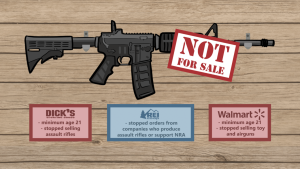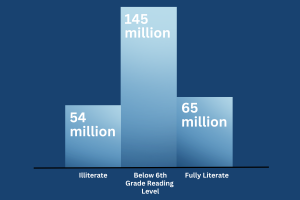Businesses overly praised for ineffective gun control
March 29, 2018
Following the Marjory Stoneman Douglas school shooting in Parkland, Florida, many have been reassured to see large retailers drop assault weapons from their stores and make them more difficult to purchase. These actions have been widely lauded by some, yet retailers such as Dick’s Sporting Goods and Walmart comprise only a fraction of overall firearms sales. As such, they should not be receiving such excessive praise for changes that will likely result in little difference in total firearms sales.
Since the Stoneman Douglas High School shooting, its students have taken a strong stance against gun violence through both conventional and social media. Unlike many mass shootings in the past, however, whose protest movements have seemed to fizzle out after a time, the current wave of anti-gun violence protest has attracted considerable attention and momentum, and the issue has been placed in the national spotlight.
“If you compare the U.S. with other countries, after one mass shooting they pass stricter gun laws and the number of mass shootings in the country decreases tremendously,” said Intersections officer and junior Dianna Shen. “In the U.S., we’ve had a huge number of mass shootings, and nothing has been done to stop them. The number only gets larger.”
With such force behind this movement, corporations have fallen in line with the students; many large retailers that sell assault weapons such as Dick’s Sporting Goods, Walmart and REI, will either raise requirements to purchase assault or stop carrying them altogether, while raising restrictions on all other firearms in general. The reactions to these decisions have been largely positive.
“I think it’s good because in general, most people don’t need assault weapons,” said senior Davin Tjong. “Those things are just for war, and we’re not fighting a war here.”
Regardless of public opinion, however, it remains to be seen whether these changes will have a significant impact on overall firearms sales. Currently, only 12 percent of AR-style rifles, like the one used at Stoneman Douglas, are purchased from retailers, with the large majority being sold at specialized gun stores. Additionally, after every mass shooting, firearms sales increase as fears of gun restrictions inflate, with the most recent shooting being no exception. Thus, although these retailers’ new policies may make a small dent in firearms sales, they will likely not balance out the increased sales following Parkland. If retailers wished to affect gun sales in a significant manner, they could contribute money to political causes. Retailers, however, have instead decided that the best course of action would be to increase restrictions on gun purchases in their own stores, rather than target policies that may make a bigger difference. One interpretation of these events is that these large retailers are riding the wave of public opinion to garner goodwill from potential customers, rather than actually pursuing effective change. However, this may not be so bad.
“Even if it’s a public relations stunt it’s good because it’s making a statement,” said Tjong. “Even if you argue that it’s not the retailers’ place, it’s sending a message to lawmakers that they want to see change too.”
These retailers are thus deserving of praise to an extent because they are at least attempting to make change, and have done more for student safety than Congress, which has yet to see any motions for gun control gain traction following the Parkland shooting.
“When people talk about stricter gun laws, I feel like there’s a misconception,” said Shen. “Pro-gun control people don’t want the government to take away guns altogether; they merely want to make it more difficult to obtain one. For places such as Walmart to be restricting sales for firearms I feel is a step forward in achieving this. It’s way too simple for people to obtain guns.”
It remains to be seen if these retailers are setting the pace for the nation, and if lawmakers will succeed in passing further firearms control legislation. Should mass shootings become more infrequent as a result of their actions, only then should these retailers can receive more praise for their role in reducing access to firearms and attracting national focus on this challenging issue. Until then, however, their actions should be viewed with reserved praise.



























































